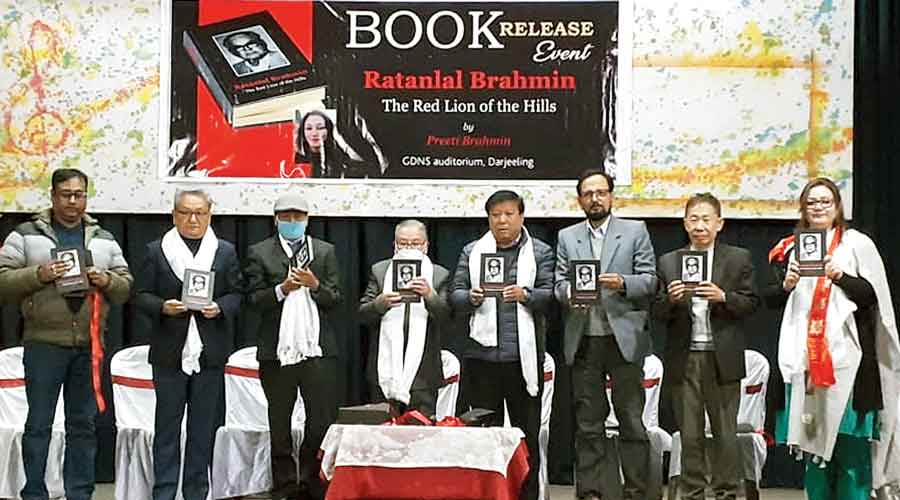Ratanlal Brahmin, the first and tallest communist from Darjeeling hills, made headlines on Sunday, three decades after his death, through his first English biography penned by his granddaughter Preeti Brahmin.
Preeti’s biography, The Red Lion of the Hills, was launched by Krishan Singh Moktan, former inspector-general (jails) and a writer, at the Gorkha Dukha Niwarak Sammelan (GDNS) hall here.
The irony of Moktan’s presence could not be missed.
He was the superintendent of Dum Dum Central Jail in 1965 when Ratanlal, popularly known as Maila Bajae (older grandfather) was lodged there with eminent communists like Jyoti Basu, who was his lifelong friend, Promode Dasgupta and others.
Moktan recalled how police had to break Maila Bajae’s prison cell to force-feed him to end a protest of communist leaders in jail. The hill leader had been mercilessly thrashed by police earlier. “The doctors said one of his legs would have to be amputated but he recovered without surgery,” said Moktan.
Maila Bajae was one of the founders of GDNS in 1932 and with the core job to give a “decent burial” to mostly Gorkha people, whose bodies would often be lying on the streets during the British era.
Preeti’s book traces Maila Bajae’s journey from a child born in an affluent family, who was orphaned young. He worked as a cook, became a rebel who took up social issues and the tallest communist leader of the region.
Maila Bajae had many “firsts” , said Amar Singh Rai, former Darjeeling MLA. He was the first comrade from hills after CPI leader Sushil Chatterji convinced him to join the party in 1943. He was the first leader from the hills to start a workers’ union and was instrumental in forming a panel to demand recognition of Nepali language. He and his 50-odd friends also wrote a poster in blood against hoarders during the Bengal famine.
“Such acts earned him the sobriquet Robin Hood,” recalled Moktan.
But there were downs too. When proponents of Gorkhaland started a violent agitation in 1986, Maila Bajae’s home was razed to the ground and he was forced into exile.
When his body was brought to Darjeeling after his death in 1989, Gorkha leaders issued a diktat that none should attend his funeral as he was a communist.
“Despite the diktat many paid their last respects,” recalled a resident at the event.
Maila Bajae’s won the Bengal provincial election from Darjeeling in 1946, one of the only three communists to win this election along with Jyoti Basu, his lifelong friend, and Roopnarayan Roy, and was again elected to Parliament in 1971.
Bajae was the first to unsuccessfully try and take oath in Nepali in the Lok Sabha, then an unrecognised language and when entering the Bengal Assembly in 1946, he created a ruckus for not being allowed to enter the hall with a khukri.
“People would ask me for references on my grandfather’s life and when I found little written in English, I decided to start this project,” said Preeti, who is in her early 40s.
“I have tried to enlighten the readers through anecdotes on why he denounced khukri and his life beliefs and his immense love for the community,” said Preeti.











